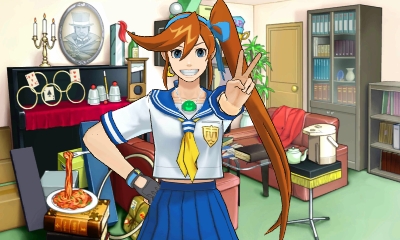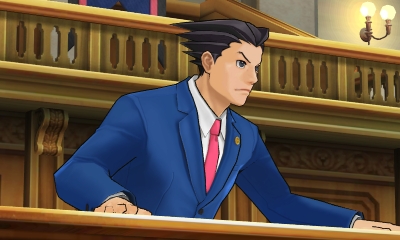In the dark age of the law, truth has no place within the confines of a courtroom. Reality is nothing more than an unreliable recollection of events by a flawed person. How can we trust memories that are tempered by emotions, undermined by biases, and torn apart by baseless assumptions? Truth and lies are much closer than people would want to believe, and to pretend otherwise is disingenuous. Phoenix Wright: Ace Attorney - Dual Destinies explores the twisted path of the judicial system. When the end is the only thing that matters, the means you use to arrive at that point isn't important. Or is it? The moral quagmire of the law is a difficult road to navigate and Dual Destinies weaves a clever analysis of this fascinating process.
Apollo Justice has sworn to protect those wrongly accused of heinous crimes, but an attorney has only so much power to right injustices. When one of his friends is accused of murdering another, his duty to seek justice goes much further than a mere courtroom could allow. Such dramatic events are interspersed with comedic jabs so you're never burdened by these lofty themes. Cutting insults hurled at the buffoonish judge by prisoner-turned-lawyer Simon Blackquill inject levity within the heated debates, and spirited newcomer Athena Cykes displays an energetic naivete while she deconstructs the emotions of those who take the stand. Dual Destinies expertly balances two narrative extremes, using off-the-wall dialogue at key moments to keep the mood light even when the characters are grappling with their own limitations.

Practicing law within the Phoenix Wright universe requires a cleverness better suited to authors of courtroom drama than to actual barristers. While scouring a crime scene, you may find a trinket seemingly unrelated to the facts of a murder, but you tuck it in your inventory without question, in case its importance becomes known during the court proceedings. Pretrial investigations push you from one disorderly scene to another, and you interview potential witnesses to slowly piece together what actually happened. Such activities are performed by rote because there's little variance in what's expected of you. A checklist chronicles exactly what you must accomplish before the next event is triggered, so although the occasional eureka moments stamp exclamation points onto your actions, you're so rarely asked to think beyond the basics that you're left going through the motions until court is in session.
Off-the-wall dialogue at key moments keeps the mood light even when the characters are grappling with their own limitations.

Verbal sparring within the courtroom rises above the pleasant predictability of the investigative process. Witnesses provide testimony tinged with contradictions, so you must scour your evidence to find the piece that proves they're lying. Following the breadcrumb trails of lies to an ultimate truth gives weight to every objection you utter. Although the committed crimes are incredibly complex in how they were performed, there's an underlying plausibility that makes it easy to accept the outcomes. From motivations to opportunities to the method for covering up his or her actions, the perpetrator's thought process is eventually unraveled and displayed in detail. To succeed within the stressful back-and-forth swings is to discover the very essence of truth, and the game masterfully urges you onward to unearth the secrets that lie hidden deep below the surface.
Trust is often the only thing that keeps Phoenix Wright and his colleagues afloat when odds seem stacked against them. The bonds of friendship run so deep that even when every piece of evidence is screaming that the defendant's hands are covered in red, the unwavering belief in his or her innocence keeps the attorneys pushing to explain how the crime actually transpired. And though such loyalty is admirable, it creates situations that border closely on the dangerous adage "the end justifies the means." This phrase is uttered by those who have ushered in the dark age of the law, ignoring truth for the greater good, and though Phoenix strongly disagrees with that theory, he is forced to use creative means to avoid guilty verdicts. Concocting questionable alternate theories eventually brings Phoenix to the truth, but he tears down the wall separating fact from fiction to come to those conclusions.
The game masterfully urges you onward to unearth the secrets that lie hidden deep below the surface.
Because of the dance both the defense and prosecution must perform, Dual Destinies presents both sides of the coin in the the ongoing discussion about achieving justice while working within a flawed judicial system. As much as Phoenix's team members deny the benefits of lying to further their goals, they are guilty of the same actions, so you understand why someone would twist facts for their own purpose. It's fascinating to see these scenes play out. A witness may lie because he's covering up his own despicable actions, trying to hide that he is really guilty of a murder most foul. But other times, lies surface only to protect a loved one. Would you testify if you knew your words could send your friend to prison? Dual Destinies shows just how scary the truth can be, so you sympathize with those who turn their backs on it.

There are times when someone changes reality to fit their own needs, but those aren't the only lies that exist in Dual Destinies. Words are empty to Athena Cykes. As a trained psychoanalyst, she knows that people can say whatever rushes into their heads, but their emotions are unfiltered. When Athena discovers discord, she analyzes the emotions of whoever is on the witness stand to figure out what he or she refuses to say out loud. Why would someone be happy when a ceiling crumbles upon them? Or sad when they don a cloak adorned with shining constellations? This simple mechanic reverberates beyond the courtroom proceeding. I started to think about my own emotions that surface when I wish they would stay hidden. Even when lying would make my life so much easier, the truth still finds a way out, and I realized while calling out witnesses on their contradictory feelings just how pointless it is to hide from who you are.
Dual Destinies dives deep within the psyches of those involved in crimes--from the attorneys to the perpetrators and everyone else associated with the events--and such ruminations give you a better understanding of human motivations. The manner in which you investigate and argue is unchanged from previous iterations, and the exaggerated personalities of the characters hit the same notes as before, which does lessen the mysterious appeal of a courtroom drama. However, Dual Destines is more than just another retread. Themes of friendship and trust make you appreciate the depth of relationships, and the omnipresent question of the necessity of truth provides a compelling backdrop. Phoenix Wright's return to the courtroom brings with it an impressive blend of comedic sensibilities and philosophical examinations that make you question how any judicial system can determine guilt when the relationships people have with the truth are so complicated.